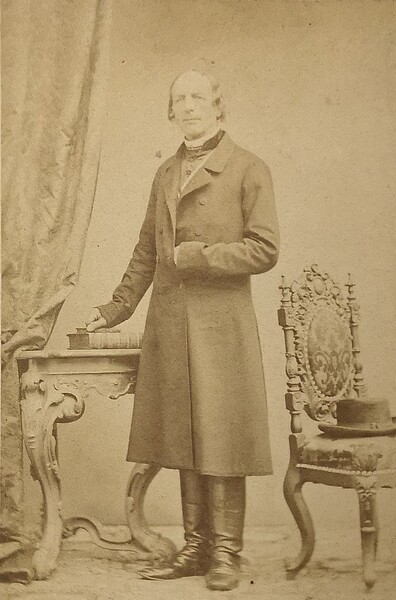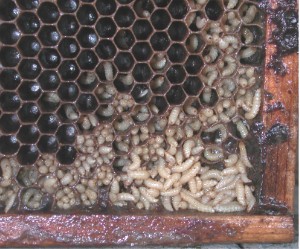|
Josef Stern
Josef Stern (14 March 1797 – 11 May 1871) was an Austrian priest and a promoter of beekeeping. He wrote an early guide to beekeeping and was among the first to notice foulbrood disease. He worked at the Augustinian Canons' Monastery of St. Florian at Wachau. Stern was born in Alberndorf in Pulkautal (Lower Austria), the son of farmers Georg and Elenora née Widl Josef. He was educated at the Augustinian Canons' Monastery of St. Florian and was ordained priest in 1823. He worked in various churches first at Windhaag near Freistadt at Regau from 1824 and at Vöcklabruck from 1826. In 1841 he moved to Weißenkirchen in the Wachau where he worked as a pastor until his death. He spent his leisure in agricultural activities including the growing of grapes and beekeeping. He conducted experiments in the parish vineyard and produced a report on viticulture and winemaking in Wachau. He began to promote a grape variety to deal with a decline in wine production from the region in the 18 ... [...More Info...] [...Related Items...] OR: [Wikipedia] [Google] [Baidu] |
European Foulbrood
Diseases of the honey bee or abnormal hive conditions include: Pests and parasites ''Varroa'' mites ''Varroa destructor'' and ''V. jacobsoni'' are parasitic mites that feed on the fat bodies of adult, pupal and larval bees. When the hive is very heavily infested, ''Varroa'' mites can be seen with the naked eye as a small red or brown spot on the bee's thorax. ''Varroa'' mites are carriers for many viruses that are damaging to bees. For example, bees infected during their development will often have visibly deformed wings. ''Varroa'' mites have led to the virtual elimination of feral bee colonies in many areas, and are a major problem for kept bees in apiaries. Some feral populations are now recovering—it appears they have been naturally selected for ''Varroa'' resistance. ''Varroa'' mites were first discovered in Southeast Asia in about 1904, but are now present on all continents except Australia. They were discovered in the United States in 1987, in New Zealand in ... [...More Info...] [...Related Items...] OR: [Wikipedia] [Google] [Baidu] |
Alberndorf Im Pulkautal
Alberndorf im Pulkautal is a town in the district of Hollabrunn in Lower Austria, Austria. Population Twin towns Alberndorf is twinned with Hainburg, Germany. Politics Mayor of the town is Christian Hartmann from the Austrian People's Party (ÖVP). Chief Officer is Marion Koran. The town council, consisting of 15 seats, is distributed to following parties after the election 2020: ÖVP 7, HLA 5, SPÖ 1, FPÖ The Freedom Party of Austria (german: Freiheitliche Partei Österreichs, FPÖ) is a right-wing populist and national-conservative political party in Austria. It was led by Norbert Hofer from September 2019 to 1 June 2021.Staff (1 June 2021"A ... 2. References Cities and towns in Hollabrunn District {{LowerAustria-geo-stub ... [...More Info...] [...Related Items...] OR: [Wikipedia] [Google] [Baidu] |
Windhaag Bei Freistadt
Windhaag bei Freistadt is a municipality in the district of Freistadt in the Austrian state of Upper Austria Upper Austria (german: Oberösterreich ; bar, Obaöstareich) is one of the nine states or of Austria. Its capital is Linz. Upper Austria borders Germany and the Czech Republic, as well as the other Austrian states of Lower Austria, Styria, a .... Population References Cities and towns in Freistadt District {{UpperAustria-geo-stub ... [...More Info...] [...Related Items...] OR: [Wikipedia] [Google] [Baidu] |
Vöcklabruck
Vöcklabruck () is the administrative center of the Vöcklabruck district, Austria. It is located in the western part of Upper Austria, close to the A1 Autobahn as well as the B1 highway. Vöcklabruck's name derives from the River Vöckla which runs through the town, whose name in turn originates from a person's name ('Vechela') and 'Ache', meaning 'flowing water' or 'river'. Vöcklabruck has many shops as well as services and schools. It was chosen for ''Europäisches Schützentreffen'' (the European Meeting of Marksmen) in 2003, and has and will play host to other events such as the ''Internationale Musiktage'' (International Music Gathering), ''Landesgartenschau'' (provincial garden show) 2007, and an ''Erdbeerfest'' (strawberry festival), among others. Population Sights The distance to Salzkammergut's lakes from Vöcklabruck ( to the Attersee, to the Traunsee, to the Mondsee, to the Hallstättersee and to the Wolfgangsee) has led to the town's description as "the ... [...More Info...] [...Related Items...] OR: [Wikipedia] [Google] [Baidu] |
Weißenkirchen In Der Wachau
Weißenkirchen in der Wachau is a town in the district of Krems-Land in the Austrian state of Lower Austria Lower Austria (german: Niederösterreich; Austro-Bavarian: ''Niedaöstareich'', ''Niedaestareich'') is one of the nine states of Austria, located in the northeastern corner of the country. Since 1986, the capital of Lower Austria has been Sankt P .... The ferry across the Danube here is interesting in that it has no motor or sail: it is powered by rudder set against the river current, anchored to a cable above the river. The ferry carries passengers, bicycles, motorcycles, and automobiles. Population Weißenkirchen in der Wachau - Zentrum.JPG, View from the market square to the parish church Rollfähre bei Weißkirchen i.d. Wachau.jpg, Ferry between Weißenkirchen and St. Lorenz before mooring at Weißenkirchen Weißenkirchen in der Wachau - Pfarrkirche.JPG, Parish church of Weißenkirchen References Cities and towns in Krems-Land District {{Lowe ... [...More Info...] [...Related Items...] OR: [Wikipedia] [Google] [Baidu] |
Johann Dzierzon
Johann Dzierzon, or Jan Dzierżon or Dzierżoń , also John Dzierzon (16 January 1811 – 26 October 1906), was a Polish apiarist who discovered the phenomenon of parthenogenesis in bees. Dzierzon came from a Polish family in Silesia. Trained in theology, he combined his theoretical and practical work in apiculture with his duties as a Roman Catholic priest, before being compulsorily retired by the Church and eventually excommunicated over the question of papal infallibility. In 1905, he was reconciled with the Catholic Church. His discoveries and innovations made him world-famous in scientific and bee-keeping circles, and he has been described as the "father of modern apiculture". Nationality/ethnicity Dzierzon came from Upper Silesia. Born into a family of ethnic Polish background which did not speak German but a Silesian dialect of the Polish language,Stanisław Feliksiak, ''Słownik biologów polskich'', Polish Academy of Sciences ''Instytut Historii Nauki, Oświaty i ... [...More Info...] [...Related Items...] OR: [Wikipedia] [Google] [Baidu] |
1797 Births
Events January–March * January 3 – The Treaty of Tripoli, a peace treaty between the United States and Ottoman Tripolitania, is signed at Algiers (''see also'' 1796). * January 7 – The parliament of the Cisalpine Republic adopts the Italian green-white-red tricolour as the official flag (this is considered the birth of the flag of Italy). * January 13 – Action of 13 January 1797, part of the War of the First Coalition: Two British Royal Navy frigates, HMS ''Indefatigable'' and HMS ''Amazon'', drive the French 74-gun ship of the line '' Droits de l'Homme'' aground on the coast of Brittany, with over 900 deaths. * January 14 – War of the First Coalition – Battle of Rivoli: French forces under General Napoleon Bonaparte defeat an Austrian army of 28,000 men, under ''Feldzeugmeister'' József Alvinczi, near Rivoli (modern-day Italy), ending Austria's fourth and final attempt to relieve the fortress city of Mantua. * January 26 – Th ... [...More Info...] [...Related Items...] OR: [Wikipedia] [Google] [Baidu] |
1871 Deaths
Events January–March * January 3 – Franco-Prussian War – Battle of Bapaume (1871), Battle of Bapaume: Prussians win a strategic victory. * January 18 – Proclamation of the German Empire: The member states of the North German Confederation and the south German states, aside from Austria, unite into a single nation state, known as the German Empire. The King of Prussia is declared the first German Emperor as Wilhelm I of Germany, in the Hall of Mirrors at the Palace of Versailles. Constitution of the German Confederation (1871), Constitution of the German Confederation comes into effect. It abolishes all restrictions on Jewish marriage, choice of occupation, place of residence, and property ownership, but exclusion from government employment and discrimination in social relations remain in effect. * January 21 – Giuseppe Garibaldi's group of French and Italian volunteer troops, in support of the French Third Republic, win a battle against the Prussians in the Bat ... [...More Info...] [...Related Items...] OR: [Wikipedia] [Google] [Baidu] |


_027-Vöcklabruck.jpg)


_(LOC)_-_Flickr_-_The_Library_of_Congress.jpg)